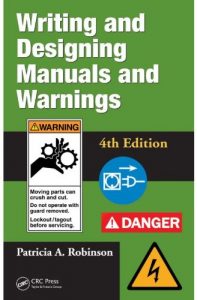Twenty-five years ago, how many people were thinking about the internet on a daily basis? Now you can find everything, including technical and instruction manuals, online. But some things never change. Users still need instructions and warnings to guide them in the safe and proper use of products. Good design, clear instructions and warnings, placement of graphics, all the traditional elements hold true whether designing for print or online materials. And technical writers still need those two most valuable commodities—time and information—to do their jobs well. Another constant, Writing and Designing Manuals and Warnings, now in its fourth edition, offers real-world guidance based on real-world know-how for the development of product documentation.
See What’s New in the Fourth Edition:
- New organization to clarify the principles of manual and warning development
- Coverage of the digital revolution and the global marketplace
- Expanded section on product safety and warnings
- Information on international standards for warnings
Backed by Research and Collective Experience
Drawn from the collective experience of hundreds of technical writers, graphic artists, and product safety engineers, along with the author’s nearly 30 years of experience helping companies improve instructions and warnings, this how-to book covers every aspect of developing state-of-the-art product manuals and safety warnings. Filled with examples that show how good manuals and effective warnings can add value to your company’s products and build repeat business, while at the same time reducing liability exposure, the text demonstrates how to create manuals that give products a competitive edge and improve customer satisfaction. Solidly grounded in research, but not a stuffy academic treatise, this down-to-earth, practical book is a survival guide for writers in the real world of short deadlines and tight budgets.






